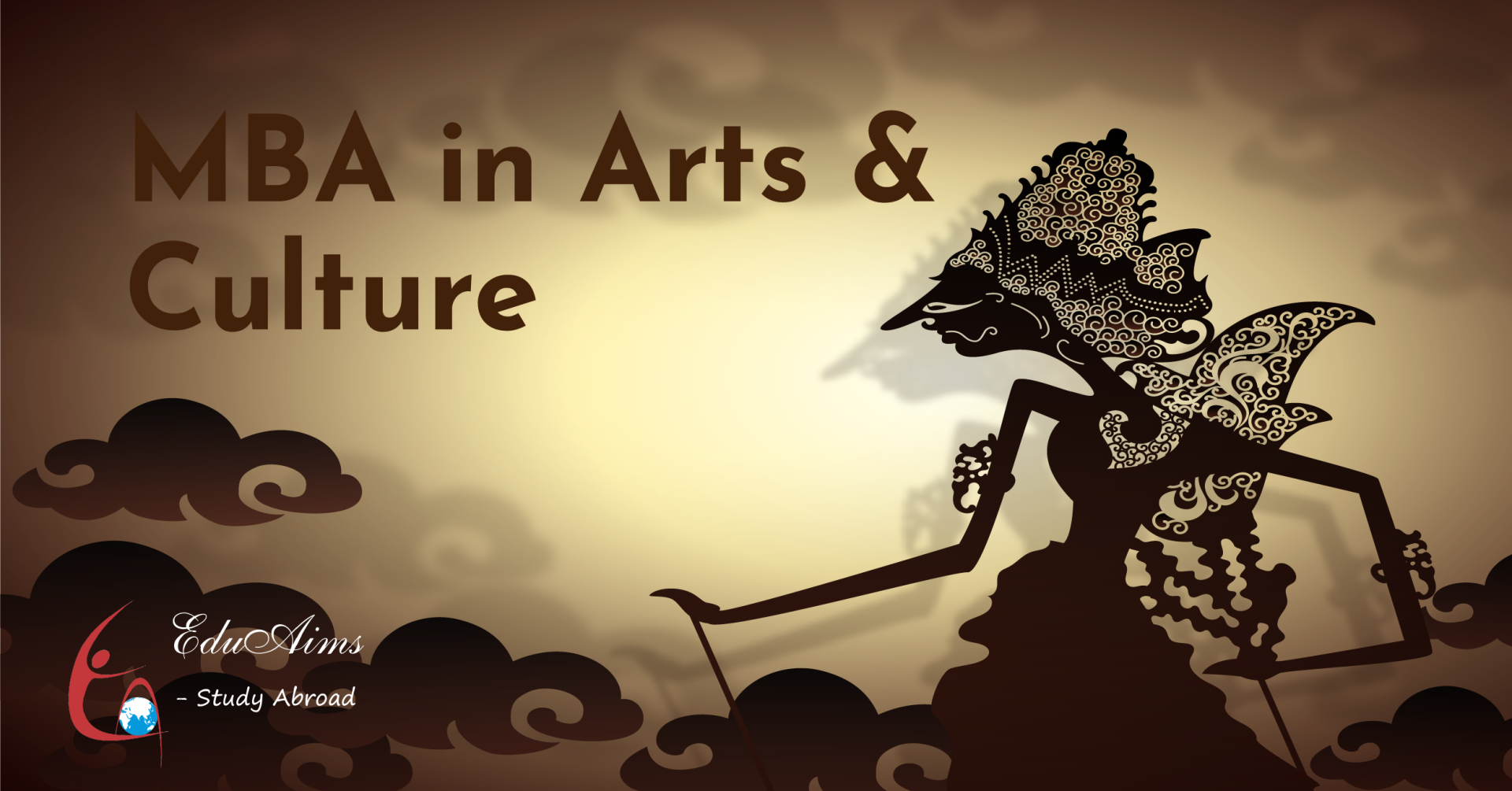What is Arts Management?
Arts management or art administration is a relatively promising discipline concerned with running a business of art, private or public, by successfully managing its behind-the-scenes operations, all adhering to the art’s and artist’s vision. In other words, it is a blend of both business decisions and artistic/cultural considerations. For instance, keeping an eye on the cost of an art gallery along with not compromising the gallery’s aesthetic aspect, all with a view on the long-term vision. An arts management degree provides the environment and resources for you to learn the ins and outs of how to do just that.
What is an Arts Management Degree?
The answer to the question ‘What is an arts management degree?’ is multi-fold. Institutions like museums, galleries, governments, opera houses etc. feel the need to manage their arts businesses as any other organisation. This involves looking after legal, economic, social and organisational commitments. If an arts business is not economically viable, it will not be able to exist. In arts and cultural management courses like MBA in Arts and Culture Management, MBA in Liberal Arts and Management or MBA in Fine Arts, candidates are given the required training to competently engage with such tasks and take decisions to sustain and grow the organisation. Some of the responsibilities include:
- Management of art pieces in galleries & museums: acquiring, sale and borrowing of artworks
- Looking after the preservation of artworks.
- Negotiating with administration for clearances, etc.
- The hiring of professionals, staff management, stage managers, compensation, etc.
- Event planning and management: venue, sponsorships, crowd management, etc.
- Budgeting and financial management: cost and revenue analysis, advertising, marketing, ticket pricing, accounting, etc.
- Public relations and communication
Art Management Courses in India
The popularity of Art Management courses in India is on the up seeing the trends in the last twenty years or so. Top colleges like NIFT and Jamia Millia Islamia offer highly accredited art management courses in India. However, in terms of MBA in Arts subjects and MBA in Fine arts, there are far better opportunities if you look abroad. Furthermore, you can also choose to go for a few years of experience in a relevant profile and then go for an MBA abroad. Experience in the field becomes a valuable asset for any candidate.
MBA in Arts and Culture Management Abroad
Here is a brief overview of the MBA in Arts and Culture Management in particular.
| Course | MBA in Arts and Culture Management or MBA in Liberal Arts and Management |
| Course Types | Full-Time, Executive, Part-Time, Distance, Dual Degrees, etc. |
| Degree Level | Postgraduate |
| Course Duration | 2 year [1-year courses also available] |
| Minimum Qualification Required for Admission | Bachelor’s Degree* |
| Admission | University-based Application [Individual-based] |
| Funding & Scholarships | Available |
* Refer to university admission guidelines.
MBA in Arts and Culture Management: Course Structure & Duration
MBA courses are created for candidates who see a future in the art industry. Thus, institutions are often innovating with the type and duration of the courses. If you are a working professional, you can opt for the Part-Time or Executive option. Furthermore, distance degree options are available for those who wish to attend from the comfort of their current engagement. Dual degree options combine multiple disciplines such as arts management and public policy or arts management or business analytics and so on.
The regular full-time route is also offered in 2 year and 1-year variants. While the former is well suited for fresh graduates, the 1-year option is geared towards working professionals who already have 1-3 years of experience.
Arts and Cultural Management Courses: MBA or MA?
Candidates are inevitably faced with the question of whether to go for an MBA or MA. While an MBA course takes on a more business-oriented approach, focusing on the ins and outs of the management side, financials, accounting, operations, marketing, event management, and like. However, the MA subjects or Masters’s courses are more academically inclined, that is, they focus on arts and cultural management as an academic discipline and look at it from the point of view of a researcher. MBA in Arts subjects includes MBA in Liberal Arts and Management, MBA in Arts and Culture Management, and MBA in Fine arts [MFA], etc.
Get Free Consultation from our Experts
MBA in Arts Subjects: Arts & Culture Management Syllabus
The MBA in Arts subjects in the programs like MBA in Arts and Culture Management and MBA in Liberal Arts and Management usually revolve around giving the candidate a thorough idea of the business of arts. This involves considerable theoretical knowledge as well as projects, seminars, and internship placements. Here is a list of subjects you can expect during your course, although they may vary.
| Marketing Management | International Business | Strategic Management | Finance Management |
| Digital Business | History of Performing Arts | Realism to 1945 | Research Methodology |
| Business game | Public Relations & Branding through Social Media | Performance and Digital Arts | Cultural Industries and Creative Entrepreneurship |
| Cultural Policy & Heritage Management | Museum Law | Economics of the Art Market | Sociology of Arts & Culture |
| History of the Decorative Arts | Corporate Social Responsibility and Financing Cultural Projects | Legal Environment of Business Applied to the Arts | Exhibitions, Identities and Politics: in Museums, Galleries and other Cultural Spaces |
| Creatives: Working in the Cultural Industries | Children, Media Industries and Culture | Culture and the City | Digital Media Production Cultures |
| Cultures of Technology | Cultural Memory | Gender, Media and Culture | Festivals: Arts, Public Spaces and Community |
Note: The above subjects are only exemplary and not the actual syllabus.
Arts and Cultural Management Courses
Given below is a list of arts and cultural management courses including an MBA in Arts and Culture Management and a few MA courses to give you a highlight of the unique types and combinations of programs on offer.
| Course | University | Location |
| MBA in Arts and Culture Management | IESA Arts and Culture School in Paris | Paris, France |
| MA in Arts Management | Bath Spa University | Bath, UK |
| Specialised Master in Management of Cultural and Artistic Activities | ESCP Business School | Paris, France |
| MBA-Arts, Media and Entertainment Management | York University | Canada |
| MBA in Arts Management | Carleton University | Canada |
| MA in Arts and Cultural Management | Sheffield Hallam University | UK |
| Arts Business MA | Kingston University | UK |
| Master in Arts Leadership and Cultural Management | Colorado State University | USA |
| MA in Arts Administration | Indiana University-Bloomington | USA |
| MSc in Art, Culture and Technology | MIT | USA |
| MA in Arts Policy and Administration | Ohio State University-Columbus | USA |
MBA in Arts and Culture Management: Eligibility
To apply for an MBA in Arts subjects at the above universities, there are certain elementary guidelines you will be expected to follow, a few of which have been listed out below. The below-mentioned guidelines are subject to change concerning the university, location, course structure and objectives.
- Equivalent qualifying degree in any discipline, for instance, a ‘Bachelors in Fine Arts’. This can be from any discipline though an arts background helps.
- Minimum marks in the qualifying degree. Typically it is on 10 pointer scale or 4 pointer scale.
- An eligibility condition typically required for an MBA in Arts and Culture Management is to possess around 1-3 years of relevant industry experience. Refer to university recommendations. Candidates not fulfilling this can be asked to undergo a Pre-MBA program.
- GRE/GMAT test scores, if required. For an MBA degree application, the GMAT is highly recommended though GRE is also widely accepted at many universities.
- Indian applicants are typically required to submit IELTS/TOEFL/PTE exam scores as evidence of their English speaking proficiency. Obtaining an over 7+ band score is usually enough to be considered.
MBA in Arts and Culture Management: Application
The primary admissions cycle typically begins in September/October and ends in February/March of the subsequent year. There are secondary admissions cycles as well. Keep checking university websites.
- Fulfill the basic eligibility requirements as mentioned above [Equivalent qualifying degree, relevant industry experience, etc.]
- Submit GMAT/GRE along with IELTS/TOEFL/PTE scores [as required].
- Application Proposal Set [Passport, Curriculum Vitae/Resume Statement of Purpose/Personal Statement/Statement of Intent, Two/Three letters of Recommendation, College Transcripts, Experience Letter (if required), Financial Support Statement/Funding Essay (if applying for scholarships/funding), etc.]
- Pay the required Application Fee.
- At the next stage, appear for Personal Interview/Group Discussion/Writing Task [if required]
- The application will be reviewed and confirmed, waitlisted or rejected usually within 2-3 months of applying.
- Deposit the required Tuition Fees or Blocking Fees.
- Submit Student Visa Application.
Arts And Cultural Management Courses: Career Opportunities
The career opportunities, as discussed earlier have been increasing at an unforeseen rate. To work at the several positions listed below and launch a career after successfully completing top-level arts and cultural management courses like MBA in Arts and Culture Management, MBA in Liberal Arts and Management or MBA in fine arts, you must also develop a problem-solving mindset and an attitude to tackle difficult situations.
- Art Director
- Event Manager
- Festival Manager
- Event Producer
- Art Advisor
- Consultant
- Theatre Producer
- Art Researcher
- Gallery Manager
- Visualizer
- Performing Arts Events Director
- Exhibition Curator
- Arts Professor
MBA in Arts and Culture Management: Employers
Common employers which are always on the lookout for graduates of MBA in Arts and Culture Management are art galleries, museums, opera houses, exhibitions, event management companies, music companies, theatres, film companies, art universities, arts consulting organizations, recreational companies, universities, amongst others.
Arts and Cultural Management Courses: FAQs
Given below are some FAQs that will help you decide as per your interests and aspirations.
Which MBA course is best for art students?
Ans. For art students, MBA in Arts subjects and MBA in Fine arts are some of the promising options on offer. This is in addition to the mainstream MBA courses in operations, consulting, business analytics, marketing, advertising, etc. A common conception is that those courses which don’t have a strong quant requirement are all great choices but you have to pick a stream that suits your objectives.
Is it required to have a quantitative background for an MBA in arts subjects?
Ans. As hinted earlier, there is NOT any specific requirement to have a strong quantitative background to pursue MBA in Arts subjects or MBA in Fine Arts. However, if you are opting for a business analytics concentration, you will be expected to be familiar with basic quant skills. It all depends on the stream you choose.
Is it possible to apply for an MBA in Arts and Culture Management without GMAT?
Ans. YES. GMAT is recommended but not a strict condition. Whilst a few institutions consider applications for MBA courses without GMAT, some don’t even ask for it at all. Nevertheless, it is suggested that you appear for the GMAT test once at least. If you obtain a good score, submit it, or else, don’t. Many top universities consider the GRE test score in place of GMAT so if you feel GRE is your strong suit, you can appear for that as well.
Is it possible to pursue a Part-time MBA in Arts and Culture Management?
Ans. YES. There are many prominent options of a Part-time MBA in Arts and Culture Management besides Full Time, Executive, Distance and Online options, amongst others.
Is it possible to pursue an MBA in Arts and Culture Management without Work experience?
Ans. YES. It is very possible to pursue an MBA in Arts and Culture Management without work experience. Work exposure is commonly required for 1-year MBA programs and Executive MBAs. If you are applying for the 2 year Regular MBA courses, work experience is typically not required.
Is it mandatory to submit IELTS or TOEFL scores to apply for an MBA in Arts and Culture Management?
Ans. MOSTLY, YES. IELTS and TOEFL are English language proficiency qualifications that are necessary if you belong to a non-native English-speaking country, in this case, India. In other words, applicants from India are compulsorily required to submit their IELTS/TOEFL scores in most colleges. Ordinarily, there is a minimum band score that you need to clear and that is enough. In some rare universities, you can get through without submitting these scores. Inquire at the university about this.



1 thought on “MBA in Arts and Culture Management”
Comments are closed.